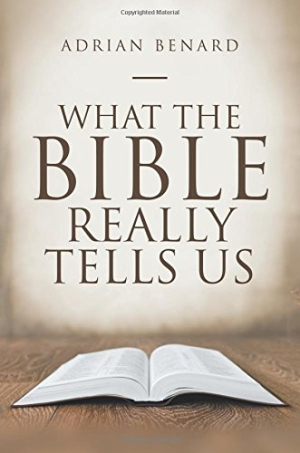What the Bible Really Tells Us
What the Bible Really Tells Us is a familiar skeptic’s approach to biblical criticism.
Adrian Benard’s What the Bible Really Tells Us is a biblically critical work that explores surprising verses from across the Bible’s books.
The book takes pointed peeks into the Bible’s texts—for example, looking at the various “gods” found throughout it, or poking holes in the creation accounts in Genesis using science.
It explores various logical inconsistencies from a scoffing perspective: where are the dinosaurs in the text? Why is God surprised when Eve eats the apple? How is it possible that God really created the Earth? This work has a mocking tone toward all who would take the Bible at face value.
Benard forwards observations that may stand to surprise some of the faithful: that the Bible talks about many gods, not just one; that it says nothing about the trinity. His book plays gotcha with the Bible’s books, throwing verses about to prove that the canon itself is foolish.
God, as encountered in the biblical books, is fallible and changes, Benard says. Related conclusions are strongly worded: the world is full of evil, so God must not exist. Those who have studied the Bible may find these approaches and conclusions basic, but they will be of interest to those just beginning to critically explore its books.
Benard’s central argument is that Christians have not really reckoned with the problems and concerns he raises. He suggests that churches themselves are hiding truths from people—but truths that they could easily find inside the Bible itself.
Knowledge and logic win the day here, leaving little room for metaphors, allusions, or myths, all of which are found in abundance in the Bible. Science is given the benefit of the doubt; the various authors of the Bible’s books, who wrote across centuries, are not.
Bernard’s explorations are organized around a variety of central topics, including topics from Genesis like creation, the fall of man, and Noah. Chapters also grapple with Moses, and the work winds toward the topic of the trinity. The book suggests people can pick and choose the topics that interest them, but such reading loses out on any subtlety and theological inquiry that the text might hold or inspire.
The book’s tone is both suspicious and dismissive. Many of its points seem to stem from resentment toward organized religion, but this is not explained beyond these biblical criticisms; instead, the book works to expose the Bible’s lies, but without adequately explaining why.
What the Bible Really Tells Us is a familiar skeptic’s approach to biblical criticism.
Reviewed by
Jeremiah Rood
Disclosure: This article is not an endorsement, but a review. The publisher of this book provided free copies of the book and paid a small fee to have their book reviewed by a professional reviewer. Foreword Reviews and Clarion Reviews make no guarantee that the publisher will receive a positive review. Foreword Magazine, Inc. is disclosing this in accordance with the Federal Trade Commission’s 16 CFR, Part 255.

